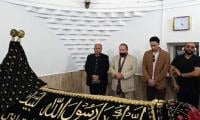KUWAIT: Kuwaiti security service officers raided farmhouses near the Iraqi border late last summer, slicing through carpets and smashing open concrete floors.
Hidden in large plastic containers was a weapons cache, the largest discovered in Kuwait’s history.
State television showed Kuwait’s Interior Minister, a senior ruling family member, solemnly viewing the results of the operation.
Kuwait charged 25 of its nationals - all of them Shias and an Iranian with spying for Iran and Lebanese group Hizbullah.
The case has opened up sectarian divisions in Kuwait. While Kuwait’s Sunni majority and Shia minority get on better than in neighbouring Saudi Arabia, tensions still exist, and relatives of some of the charged men say they are innocent victims of regional politics.
It also highlights the delicate position of many of the Gulf’s smaller states, which find themselves caught up in a power struggle between Sunni Saudi Arabia and Iran. One Middle Eastern diplomat said Kuwait, a major OPEC oil producer and home to US military bases, was squeezed between the two regional giants, who have jousted in recent months over everything from Iran’s nuclear programme to oil production.
"Kuwait is in a critical situation, a small dot in a very big triangle," he said.
"They are killing themselves to be in the middle."
Kuwaiti prosecutors said the men intended to carry out "hostile acts" against Kuwait. Members of the "Abdali cell," as local officials dubbed the group for the place the weapons were found, were charged with buying, transporting and storing weapons and explosives.
Several were also accused of receiving military training in Lebanon from Hizbullah, according to an investigation by Kuwaiti Homeland Security referred to by prosecutors in a Kuwaiti court. The men denied the charges.
In January a Kuwaiti court found 23 of the 26 guilty of various crimes. Two were sentenced to death, including one, the Iranian, in absentia. The others were fined or received jail terms between five years and life. Three were acquitted.
The prosecution is appealing the sentences, saying some of the men should have received tougher punishments. The men have all appealed their convictions.
The charges, the lawyers say, were based on confessions nearly all of the defendants allege were extracted under torture.
Khalid al-Shatti, a defence lawyer for Hassan Hajiya, the Kuwaiti man sentenced to death, said the case was politically motivated.
"There is a conflict in the region and those who pay the price of this conflict are the accused."
The Interior Ministry declined to comment for this story, referring queries to the judiciary. The judiciary did not respond to requests for comment.
The Information Ministry, which deals with general media enquiries, said it was unable to comment on the topic.
The government and state security officials have said the weapons show that Tehran was seeking to destabilise Kuwait and other countries in the region by infiltrating and manipulating local communities.
In recent months Kuwait has accused Iran of stirring up local politics and ignoring "basic diplomatic norms".
Iran has denied any connection with the alleged cell and has said Kuwaiti authorities have not contacted it regarding the Iranian defendant.
Last September, the Iranian embassy issued a rare statement expressing "deep dissatisfaction with the association of the name of Iran" with the case.
A senior Kuwaiti government official said that while Iran may not be happy with the court decision "they should respect our laws and they should also respect our internal affairs."
Liberal Justice Elena Kagan on Sept. 13, 2016. — Slate website WASHINGTON: U.S. Supreme Court justices, wading back...
A representational image of inmates behind jail bars. — Unsplash/FileMOSCOW: A Russian court on Wednesday ordered...
Sudanese soldiers guard the surrounding area of the UNMIS compound in El-Fasher, the administrative capital of North...
US quietly shipped ATACMS missiles to Ukraine. — Report news agencyWASHINGTON: The United States in recent weeks...
US President Joe Biden during his address in California. — AFP FileWASHINGTON: President Joe Biden signed a...
The World Meteorological Organisation flag. — AFP FileGENEVA: Global temperatures hit record highs last year, and...







